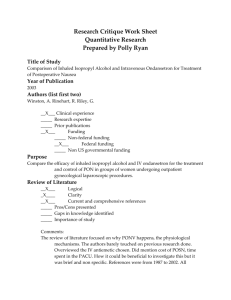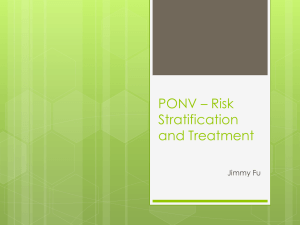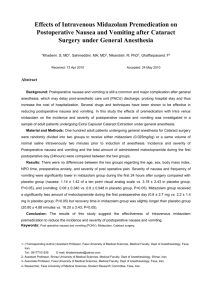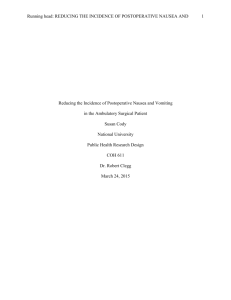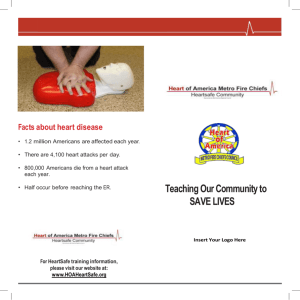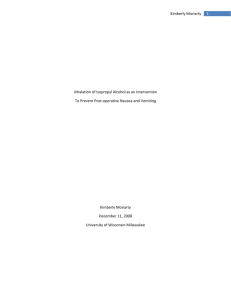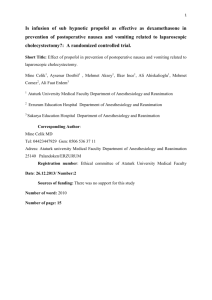article-1
advertisement
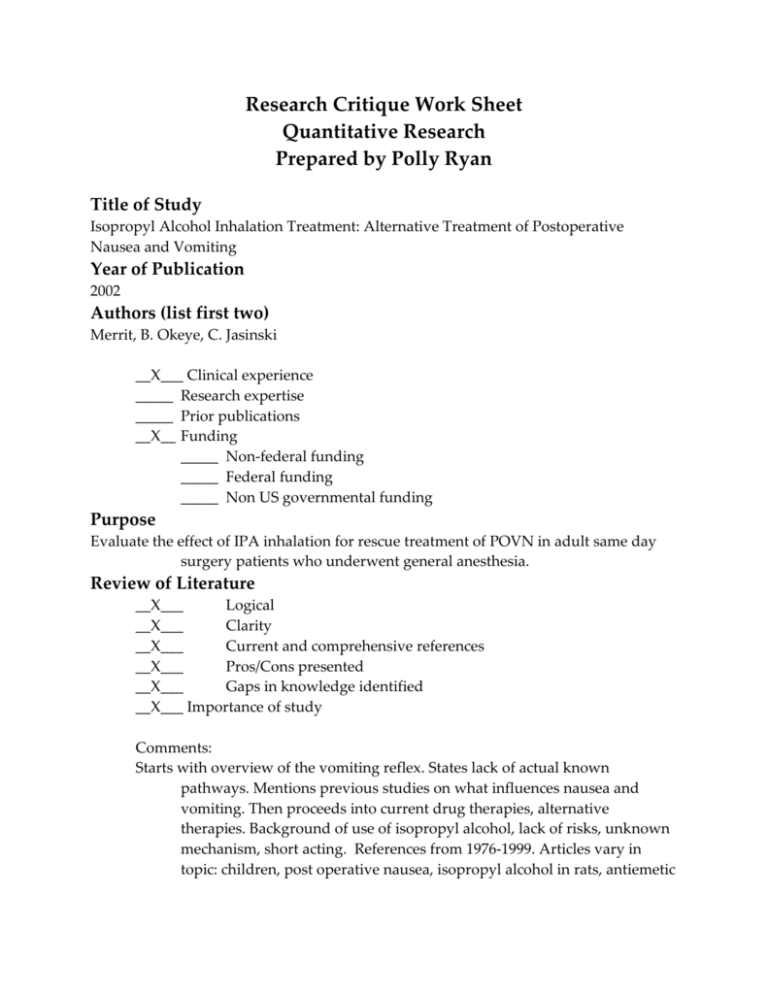
Research Critique Work Sheet Quantitative Research Prepared by Polly Ryan Title of Study Isopropyl Alcohol Inhalation Treatment: Alternative Treatment of Postoperative Nausea and Vomiting Year of Publication 2002 Authors (list first two) Merrit, B. Okeye, C. Jasinski __X___ Clinical experience _____ Research expertise _____ Prior publications __X__ Funding _____ Non-federal funding _____ Federal funding _____ Non US governmental funding Purpose Evaluate the effect of IPA inhalation for rescue treatment of POVN in adult same day surgery patients who underwent general anesthesia. Review of Literature __X___ Logical __X___ Clarity __X___ Current and comprehensive references __X___ Pros/Cons presented __X___ Gaps in knowledge identified __X___ Importance of study Comments: Starts with overview of the vomiting reflex. States lack of actual known pathways. Mentions previous studies on what influences nausea and vomiting. Then proceeds into current drug therapies, alternative therapies. Background of use of isopropyl alcohol, lack of risks, unknown mechanism, short acting. References from 1976-1999. Articles vary in topic: children, post operative nausea, isopropyl alcohol in rats, antiemetic intravenous medication use and risk factors. No studies were used that previously looked at the use of isopropyl alcohol. Research Question/Hypothesis Patients treated with inhalation of IPA would have decreased nausea and vomiting in the immediate postoperative period; Inhalation treatment would be more effective in decreasing nausea and vomiting than standard rescue treatment; IPA inhalation would decrease post anesthesia care. Study Design ___ Experimental/Randomized Clinical Trial ___X__ Quasi-Experimental _____ Correlation _____ Descriptive _____ Program Evaluation ____ Other Sample and Setting General description of participants (age, gender, etc.) 111 participants. Only 40 studied. 19-80 years old, average of 43. Surgery types included intra-abdominal, orthopedic, perineal, and neuro-skeletal. 36% had post operative nausea, 84.6% got prophylactic anti-emetics. Important Inclusion and Exclusion Criteria: Patients admitted from same day surgery. Must have had general anesthesia, ability to breathe through the nose, 18 years of age or greater, ASA physical status of 1, 2, or 3. Also had to be able to read and write in English. Could not have allergy to IPA, alcohol abuse, recent history of nausea/vomiting in last 8 hours, no recent intake of cefoperazone, antabuse, metrondazole, must have ability to communicate in recovery room, regional anesthesia, and monitored anesthesia care. Groups _____ True control group _____ Usual care group __X___ Intervention group(s) Name or brief description of group: Experimental: received inhalation treatment; three deep sniffs with the pad once inch from the nose. Repeated every five minutes for three doses. If not relieved in three doses, intravenous drug was given. Name or brief description of group: Control: Did not receive inhalation treatment. Just received intravenous anti-emetic. Type of Sample Probability _____ Simple Random Sampling _____ Stratified Random Sampling _____ Cluster _____ Systematic Non-Probability __X___ Convenience _____ Quota _____ Purposive _____ Snowball Instruments Measurement Tool What did it measure? Information about the measure: # or type questions; reliability or validity; inter-rater reliability; other DOS score Perception of nausea and vomiting, scale 0-10. Reliability/validity not measured. Similar to VAS scores. Self reported data from patient. Detailed Description of the Intervention Specific Steps of the intervention The patient reported score of nausea/vomiting, either the inhalation treatment or intravenous treatment was given. Knowledge and skills needed to deliver intervention (education, licensure, etc) Assume intervention was given by RNs. Time to deliver/use the intervention Time spent was in recovery room. Three five minute interventions or usual intervention. Time spent in recovery room was basic. How frequently does it need to be delivered and what is the time interval in between delivery? Three, five minute interventions IRB Approval __X___ Yes _____ Does not mention Threats to Validity Threats to Internal Validity _____ History _____ Maturation __X___ Testing _____ Instrumentation _____ Mortality _____ Selection Bias Threats to External Validity __X___ Novelty effects _____ Interaction of history and treatment __X___ Experimenter effect _____ Measurement effect Results Of the 21 given the intervention: 11 had relief after first dose, and 10 needed at least one intervention of standard medication. Of the 18 in the control group: 13 had relief after the first dose of standard anti-emetic. Five had no relief. Results not significant regarding differences in IPA being superior to standard medications. IPA group had average cost of 9.75. Control had average cost of 17.08. This is significant. Major Findings Few actually had PONV due to aggressive premedication. PONV could be related to pain. This study does suggest IPA is clinically important. However, does not prove to be more effective. This study points to other explanations for PONV and the associated risk factors. Strengths and Weaknesses of Study Strength Looked at the direct use of IPA for PONV treatment. Appropriate area to have intervention Uses self report for nausea scale Leaves door open for future research, Weakness Small sample size. Uses self report in patients coming out of anesthesia Didn’t break down by surgical type (more significant in abdominal surgeries?) supports previous research. Didn’t address dose, times of intervention. Ranking of Scientific Merit Agency for Health Care and Research Evaluate each study – Assign a quality number to the study Evaluate all articles within the collection of studies reviewed – Assign a Letter •Types of Evidence ____ Level 1 = meta-analysis ____ Level II = experimental studies __X__ Level III = well-designed, quasi-experimental studies ____ Level IV = well designed, non-experimental studies ____ Level V = case reports and clinical examples
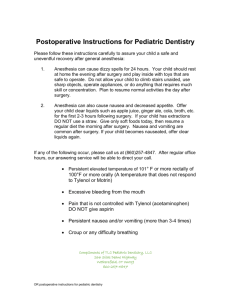
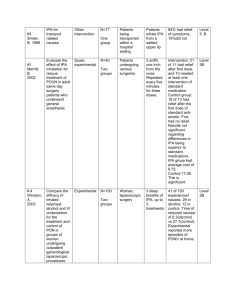
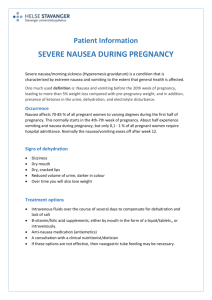
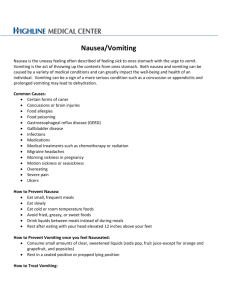
![Questionnaire used in the study Demographics GENDER: M [ ] F](http://s3.studylib.net/store/data/006712173_1-21c851410b04058d524e1b79e54e32b0-300x300.png)
